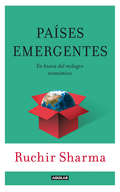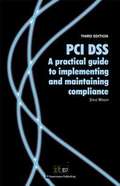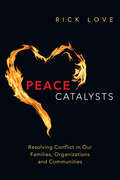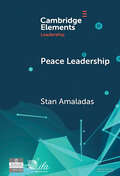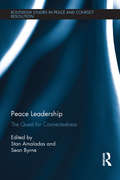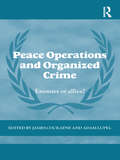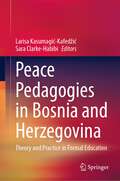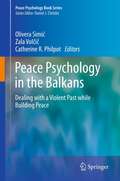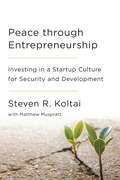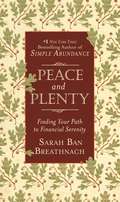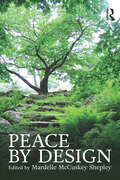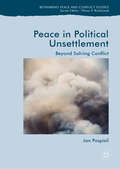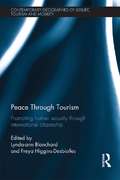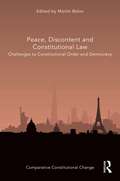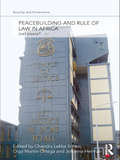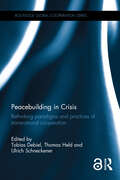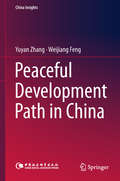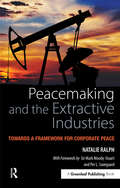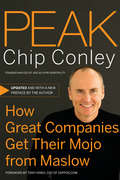- Table View
- List View
Paytm: Building a Payments Network
by Sunil Gupta Das Narayandas Rachna TahilyaniBy January 2017, Paytm, a mobile payments company that started in 2010, became India's largest mobile payments platform with over 142 million users and $5 billion valuation. Could Paytm become a $100 billion company its founder Vijay Shekhar Sharma envisioned it be?
Paytm: Building a Payments Network
by Sunil Gupta Das Narayandas Rachna TahilyaniBy January 2017, Paytm, a mobile payments company that started in 2010, became India's largest mobile payments platform with over 142 million users and $5 billion valuation. Could Paytm become a $100 billion company its founder Vijay Shekhar Sharma envisioned it be?
Paytm: Building a Payments Network
by Sunil Gupta Rachna Tahilyani Narakesari NarayandasBy January 2017, Paytm, a mobile payments company that started in 2010, became India’s largest mobile payments platform with over 142 million users and $5 billion valuation. Could Paytm become a $100 billion company its founder Vijay Shekhar Sharma envisioned it be?
Países emergentes: En busca del milagro económico
by Ruchir SharmaUna obra imprescindible que analiza desde la seriedad del trabajo documentado y del saber económico la burbuja inmobiliaria que se está formando en los países del BRIC (Brasil, Rusia, India, China) y de su posible caída. Cambiará tu visión del mundo. Nadie puede decir con seguridad cuáles son los factores que posibilitan o no el crecimiento de un país. No existe una fórmula mágica; tan sólo una lista de ingredientes: permitir el flujo libre de mercado de bienes, dinero e individuos, fomentar el ahorro, hacer valer el Estado de derecho y proteger los derechos de propiedad, construir buenas carreteras, etcétera. No obstante, estos aspectos son meras instrucciones de uso. Ni la aplicación de los mismos ni su combinación garantizan el crecimiento de una nación en un momento dado. Para identificar los países que se desmarcarán en la carrera por el crecimiento es crucial no perder de vista cuáles son las fuerzas económicas y políticas que estánen juego en este momento. Aldous Huxley dijo una vez que «viajar es descubrir que todo el mundo se equivoca respecto a otros países». Partiendo de esta observación histórica Ruchir Sharma, experto en Mercados de Valores Emergentes y Macroeconomía en Morgan Stanley, nos propone un recorrido único por las economías más interesantes del mundo emergente. Una obra inteligente y lúcida que nos plantea una nueva realidad: después de una década frenética aquellos mercados que fueron reconocidos a nivel mundial como emergentes están a punto de frenar el ritmo de crecimiento. ¿Qué nuevos países serán capaces de desafiarlos? Reseñas:«Ruchir Sharma ha escrito una obra fascinante y capital; nada menos que una nueva guía de economía global. Gracias a una prosa lúcida da la vuelta a algunos de los preceptos tradicionales, señala nuevas tendencias y descubre nuevas fuentes de crecimiento. Países emergentes es uno de los libros acerca del panorama económico actual más interesantes que he leído en años».Fareed Zakaria, autor de The Post-American World «Uno de los 21 libros que leer en 2012».Foreign Policy «El director de la división de mercados emergentes de Morgan Stanley nos lleva alrededor del mundo en busca de nuevos mercados listos para despegar. Sharma es capaz de acercarnos con habilidad a aquellos países que defraudarán o excederán expectativas en los próximos años. Para inversores y para todo tipo de lector que quiere entender el panorama de la economía global en mitad de la gran recesión».Kirkus Reviews «Un manual para guiarnos, un gran mapa sobre el nuevo y mejor equilibrado mundo en el que vamos a vivir».The Independent «No encontrarás una lectura mejor si lo que buscas es un libro que te aclare el panorama mundial de países en expansión».Jonathan Anderson, Wall Street Journal «Accesible para los novatos y revelador para los veteranos, las reflexiones de Sharma ponen patas arriba las creencias populares sobre cómo triunfar en el mercado global actual».Publishers Weekly «Es refrescante leer Países emergentes pues ofrece una visión meditada y justificada que incluye previsiones sobre el implacable ascenso de los países BRIC».Financial Times
Pci Dss: A Practical Guide To Implementing And Maintaining Compliance
by Steve WrightIf you're looking for a concise, easy to follow reference to PCI DSS compliance - you've just found it!This newly revised, practical guide, gives you a step by step guide to achieving Payment Card Industry Data Security Standard (PCI DSS) compliance - showing you how to create, design and build a PCI compliance framework. The objective of this revised practical guide is to give entities advice and tips on the entire PCI implementation process. It provides a roadmap, helping entities to navigate the broad, and sometimes confusing, PCI DSS v2, and shows them how to build and maintain a sustainable PCI compliance programme. This latest revision also includes increased guidance on how to ensure your compliance programme is 'sustainable' and has been based on real-life scenarios, which should help to ensure your PCI compliance programme remains compliant. Benefits to business include: Save time and money with an easy to follow route-map to achieving PCI DSS compliance Understand the fundamental ins and outs of PCI DSS compliance Build your business case for PCI DSS compliance by providing the key information neededThere is a huge amount of information on the PCI DSS freely available, but it doesn't always answer your fundamental questions. Whether you're a manager, executive or director involved in the PCI compliance process as part of your day to day activities, then this book also functions as a key support reference.
Peabody Essex Museum: What Next?
by V. Kasturi Rangan Jeffrey RayportThe case describes the 25-year transformation of Peabody Essex Museum, which was created in 1993 by the merger of two sub-scale predecessor cultural institutions, operating since 1799, in Salem, Massachusetts. Dan Monroe, its founding CEO, began a process of building the institution, which, when he arrived, had a budget of $3 million and an endowment of $23 million in 1993, as compared to a budget of $33 million and an endowment of $650 million in 2018. Monroe made changes in practically every aspect of the museum's operations as PEM broke into the ranks of the top 15 museums in the U.S. All of this was happening at a time when museums in general had lost some 20% in visitation as a result of significant shifts in population demographics and what they understood by "cultural experience." As Dan Monroe handed off the reins of an institution that had successfully run counter to trend to his successor in 2019, the trustees of the museum and its new CEO faced the challenge of how to keep the positive momentum going - and how potentially to reinvent PEM again for a rapidly changing world.
Peace Catalysts: Resolving Conflict in Our Families, Organizations and Communities
by Rick Love"If it is possible, as far as it depends on you, live at peace with everyone." —Romans 12:18 Conflict happens. It's a painful reality of life in a fallen world. But we don't need to be content with broken relationships—conflict resolution is possible. God's intention for us and for the world is for all to live in peace with one another, and Christian peacemakers have an unparalleled opportunity to be true ambassadors of reconciliation. Rick Love, founder and president of Peace Catalyst International, shares the principles that have guided his peacemaking efforts around the world. Masterfully blending Scripture and personal experience, he provides a biblical framework for how the God of peace seeks restoration for all who experience conflict—in the home and workplace and even across international borders. With the life of Jesus as the prime example, Love equips and empowers peacemakers of all stripes to integrate evangelical witness with commitment to reconciliation. We can walk in the footsteps of Jesus as catalysts of peace, bringing transformation and hope to a world crying out for healing and forgiveness.
Peace Leadership: A Story of Peace Dwelling (Elements in Leadership)
by Stan AmaladasPeace dwelling is formulated as a reciprocal relationship among four interrelated ways of 'Being': Being a Guardian, Being a Curator, Being a Welcoming Presence, and Being a Neighbour. These ways of 'Being' are connected to a systemic reconstruction of Burns' formulation of the essential task of leadership, which encompasses the interconnectedness among the affairs of the Head (consciousness raising because values exist only where there is consciousness), the Heart (feeling the need to meaningfully define values, because where nothing is felt, nothing matters), the Hands (purposeful action) and the Holy (treating persons like persons as a non-negotiable and sacred practice, while believing that all persons can be lifted into their better selves). Corresponding to the four ways of Being, Peace Leadership is interpreted as the art of learning how to properly integrate the affairs of 4-Hs into our own shared lived existence for the sake of dwelling in peace.
Peace Leadership: The Quest for Connectedness (Routledge Studies in Peace and Conflict Resolution)
by Stan Amaladas and Sean ByrneThis book examines the concept of peace leadership, bringing together scholars and practitioners from both peace and conflict studies and leadership studies. The volume assesses the activities of six peace leaders, the place and role of women and youth in leading for peace, military peace leadership, Aboriginal peace leadership, and theoretical frameworks that focus on notions of ecosystems, traits, and critical care. It provides insights into how Peace Leaders work to transform inner and external blockages to peace, construct social spaces for the development of a culture of peace, and sustain peace efforts through deliberate educative strategies. Conceptually, the primary aim of this book is to obtain a better understanding of peace leadership. Practically, this book presents one means of influencing our community (communities) to face its problems for the sake of challenging and helping our readers to understand and make progress on all that stands in the way of peace (connectedness). The contributions to this volume are drawn together by the overarching aim of this volume, which addresses the following question: What are the concerns, dilemmas, challenges, and opportunities for those who choose to lead and take risks for peace? This book will be of much interest to students of peace studies, conflict resolution, leadership studies and IR in general.
Peace Operations and Organized Crime: Enemies or Allies? (Cass Series on Peacekeeping)
by James Cockayne Adam LupelPeace operations are increasingly on the front line in the international community’s fight against organized crime; this book explores how, in some cases, peace operations and organized crime are clear enemies, while in others, they may become tacit allies. The threat posed by organized crime to international and human security has become a matter of considerable strategic concern for national and international decision-makers, so it is somewhat surprising how little thought has been devoted to addressing the complex relationship between organized crime and peace operations. This volume addresses this gap, questioning the emerging orthodoxy that portrays organized crime as an external threat to the liberal peace championed by western and allied states and delivered through peace operations. Based upon a series of case studies it concludes that organized crime is both a potential enemy and a potential ally of peace operations, and it argues for the need to distinguish between strategies to contain organized crime and strategies to transform the political economies in which it flourishes. The editors argue for the development of intelligent, transnational, and transitional law enforcement that can make the most of organized crime as a potential ally for transforming political economies, while at the same time containing the threat it presents as an enemy to building effective and responsible states. The book will be of great interest to students of peacebuilding, peace and conflict studies, organised crime, Security Studies and IR in general.
Peace Pedagogies in Bosnia and Herzegovina: Theory and Practice in Formal Education
by Larisa Kasumagić-Kafedžić Sara Clarke-HabibiThis collection presents interdisciplinary perspectives on educating for peace in Bosnia and Herzegovina. It explores a range of theories, contexts, pedagogies and practices within formal education settings and draws attention to the multiple roles that teachers play in fostering socially transformative learning. The volume offers readers a critical exploration of peace pedagogy as an imagined ideal and fluid space between post-war educational politics, institutional and curricular constraints, and the lived experiences and identities of teachers and students in socially and historically situated communities. The book highlights local voices, initiatives and practices by illustrating good examples of how classrooms are being connected to communities, teacher education programs and teachers’ continued professional development. It demonstrates why and how the grammars of peace in Bosnia and Herzegovina are still in a state of flux and negotiation, and what the implications are for classroom practice and pedagogy. Recommendations are offered for policymakers, curriculum developers, teacher educators and teachers on how peace pedagogies can be promoted at all levels of the education system and through pre-service and in-service teacher education, taking into account the structural uniqueness of the country.
Peace Psychology in the Balkans
by Catherine R. Philpot Olivera Simić Zala VolčičThe volume covers the development of peace psychology in the Balkans. The Balkans is a region marked by post-communist and post-conflict transitional turmoil, and this book provides a comprehensive introduction to research in peace psychology in this part of the world, written by scholars primarily working in the Balkan area. It brings together innovative scholarship that examines interdisciplinary aspects of peace psychology researched and written by scholars from Kosovo, Serbia, Bosnia, Bulgaria, Romania, Macedonia, Croatia, and Slovenia as well as presenting research that responds to contemporary global issues by tracking the ways in which peace psychology is developing and implementing in the Balkans.
Peace Through Entrepreneurship: Investing in a Startup Culture for Security and Development
by Matthew Muspratt Steven R. KoltaiJoblessness is the root cause of the global unrest threatening American security. Fostering entrepreneurship is the remedy.The combined weight of American diplomacy and military power cannot end unrest and extremism in the Middle East and other troubled regions of the world, Steven Koltai argues. Koltai says an alternative approach would work: investing in entrepreneurship and reaping the benefits of the jobs created through entrepreneurial startups.From 9/11 and the Arab Spring to the self-proclaimed Islamic caliphate, instability and terror breed where young people cannot find jobs. Koltai marshals evidence to show that joblessness-not religious or cultural conflict-is the root cause of the unrest that vexes American foreign policy and threatens international security.Drawing on Koltai's stint as senior adviser for Entrepreneurship in Secretary Hillary Clinton's State Department, and his thirty-year career as a successful entrepreneur and business executive, Peace through Entrepreneurship argues for the significant elevation of entrepreneurship in the service of foreign policy; not rural microfinance or mercantile trading but the scalable stuff of Silicon Valley and Sam Walton, generating the vast majority of new jobs in economies large and small.Peace through Entrepreneurship offers a nonmilitary, long-term solution at a time of disillusionment with Washington's "big development" approach to unstable and underdeveloped parts of the world-and when the new normal is fear of terrorist attacks against Western targets, beheadings in Syria, and jihad. Extremism will not be resolved by a war on terror. The answer, Koltai shows, is stimulating entrepreneurial economic opportunities for the virtually limitless supply of desperate, unemployed young men and women leading lives of endless economic frustration.
Peace and Plenty: Finding Your Path to Financial Serenity
by Sarah Ban Breathnach"When money is plentiful, this is a man's world. When money is scarce, it is a woman's world." Unearthed in a 1932 Ladies Home Journal, this quote is the call to arms that begins PEACE AND PLENTY, Sarah Ban Breathnach's answer to the world's-- and her own personal-- financial crisis. As only Ban Breathnach can, she culls together this compendium of advice, deeply personal anecdotes, and excerpts from magazines, books, and newspapers-- particularly those of the Great Depression-- to inspire readers who are mired in today's financial difficulties. Focusing on her own personal path, Sarah Ban Breathnach will relate never-before revealed details about how she fell from the financial top to the bottom. Readers will immediately see how deeply she understands the plight of those trying to maintain a happy and comfortable home, while at the same time not even knowing if they will be able to make the mortgage to keep that home. Sarah has proved to be the voice of comfort for years to women who are spiritually bankrupt, and now she will reach to those who are financially strapped, showing them how to pull themselves out of their psychic and fiscal crises while providing deep comfort and reassurance throughout.
Peace and Prosperity through World Trade
by Fabrice Lehmann Jean-Pierre LehmannThe International Chamber of Commerce (ICC) was created in 1919 by business leaders who described themselves as 'merchants of peace' and whose motto was 'world peace through world trade'. Since then a number of initiatives, including the founding of the WTO in 1995, have provided the proper regulatory conditions for a dramatic increase in world trade. This has generated unprecedented growth and allowed many countries to enjoy great gains in wealth and welfare. Yet despite these gains we are still far from achieving the ICC's goal of world peace through world trade. This book provides a broad overview of the forces that shape international trade and global interdependence, showing business leaders and entrepreneurs how we can address the shortcomings of the multilateral trading system. Most importantly, it shows how we can turn international trade into one of the key global instruments to achieve peace and prosperity in the twenty-first century.
Peace by Design
by Mardelle McCuskey ShepleyWe live in an era in which designers will make an essential and critical contribution to the health and success of humanity. Design can promote healing in healthcare environments, contribute to good mental health, reduce gun violence, and positively impact health and racial equity, all of which contribute to providing a more peaceful world.The primary focus of this book is to inspire young designers, academics, and practitioners to achieve their maximum societal contribution. It also supports experienced designers seeking reaffirmation of their social goals. To provide a foundation, the first chapter discusses the definition of design and design thinking and evidence regarding the direct and indirect contributions of design to peace. The subsequent chapters address peace endeavors at six scales of the physical environment: sustainable and equitable design, landscape architecture, architecture, interior design, industrial design, and graphic design. Additionally, nine short cameos are provided by contributors from various disciplines, who provide their favorite examples of “peace projects.” Peace can be manifested at multiple levels: world-wide, neighborhood and community, familial, or individual, and the various authors discuss portions from this spectrum. They broadly endorse disciplinary entanglements as a means of addressing societal and sustainability challenges and celebrate the impact of collaboration.This book is essential reading for students and practitioners representing all fields of design, including graphic design, industrial design, interior design, architecture, landscape architecture, and urban design.
Peace in Political Unsettlement: Beyond Solving Conflict (Rethinking Peace and Conflict Studies)
by Jan PospisilInternational peacebuilding has reached an impasse. Its lofty ambitions have resulted in at best middling success, punctuated by moments of outright failure. The discrediting of the term ‘liberal peacebuilding’ has seen it evolve to respond to the numerous critiques. Notions such as ‘inclusive peace’ merge the liberal paradigm with critical notions of context, and the need to refine practices to take account of ‘the local’ or ‘complexity’. However, how this would translate into clear guidance for the practice of peacebuilding is unclear. Paradoxically, contemporary peacebuilding policy has reached an unprecedented level of vagueness. Peace in political unsettlement provides an alternative response rooted in a new discourse, which aims to speak both to the experience of working in peace process settings. It maps a new understanding of peace processes as institutionalising formalised political unsettlement and points out new ways of engaging with it. The book points to the ways in which peace processes institutionalise forms of disagreement, creating ongoing processes to manage it, rather than resolve it. It suggests a modest approach of providing ‘hooks’ to future processes, maximising the use of creative non-solutions, and practices of disrelation, are discussed as pathways for pragmatic post-war transitions. It is only by understanding the nature and techniques of formalised political unsettlement that new constructive ways of engaging with it can be found.
Peace through Tourism: Promoting Human Security Through International Citizenship (Contemporary Geographies of Leisure, Tourism and Mobility)
by Freya Higgins-Desbiolles Lynda-Ann BlanchardPeace through tourism refers to a body of analysis which suggests tourism may contribute to cross-cultural understanding, tolerance and even peace between communities and nations. What has been largely missing to date is a sustained critique of the potential and capacities of tourism to foster global peace. This timely volume fills this void, by providing a critical look at tourism in order to ascertain its potential as a social force to promote human rights, justice and peace. It presents an alternative characterisation of the possibilities for peace through tourism: embedding an understanding of the phenomenon in a deep grounding in multi-disciplinary perspectives and envisioning tourism in the context of human rights, social justice and ecological integrity. Such an approach engages the ambivalence and dichotomy of views held on peace tourism by relying on a pedagogy of peace. It integrates a range of perspectives from scholars from many disciplinary backgrounds, non-governmental organisations (NGOs), tourism industry operators and community, all united by an interest in critical approaches to understanding peace through tourism. Additionally diverse geo-political contexts are represented in this book from the USA, India, Japan, Israel, Palestine, Kenya, the Koreas, Indonesia, East Timor and Indigenous Australia. Written by leading academics, this groundbreaking book will provide students, researchers and academics a sustained critique of the potential and capacities of tourism to foster global peace.
Peace, Discontent and Constitutional Law: Challenges to Constitutional Order and Democracy (Comparative Constitutional Change)
by Martin BelovThis book offers a multi-discursive analysis of the constitutional foundations for peaceful coexistence, the constitutional background for discontent and the impact of discontent, and the consequences of conflict and revolution on the constitutional order of a democratic society which may lead to its implosion. It explores the capacity of the constitutional order to serve as a reliable framework for peaceful co-existence while allowing for reasonable and legitimate discontent. It outlines the main factors contributing to rising pressure on constitutional order which may produce an implosion of constitutionalism and constitutional democracy as we have come to know it. The collection presents a wide range of views on the ongoing implosion of the liberal-democratic constitutional consensus which predetermined the constitutional axiology, the institutional design, the constitutional mythology and the functioning of the constitutional orders since the last decades of the 20th century. The constitutional perspective is supplemented with perspectives from financial, EU, labour and social security law, administrative law, migration and religious law. Liberal viewpoints encounter radical democratic and critical legal viewpoints. The work thus allows for a plurality of viewpoints, theoretical preferences and thematic discourses offering a pluralist scientific account of the key challenges to peaceful coexistence within the current constitutional framework. The book provides a valuable resource for academics, researchers and policymakers working in the areas of constitutional law and politics.
Peacebuilding and Rule of Law in Africa: Just Peace? (Security and Governance)
by Chandra Lekha SriramThe promotion of the rule of law has become an increasingly important element of peacekeeping and peacebuilding operations, particularly in Africa, where there have been numerous internal armed conflicts and missions over the last decade. This book explores the expanding international efforts to promote rule of law in countries emerging from violent conflict. With a focus on Africa, the authors critically examines the impact of these activities in relation to liberal peacebuilding, rule of law institutions, and the range of non-state providers of justice and security. They also assess the virtues and limitations of rule of law reform efforts, and policy alternatives. It brings together expert scholars and practioners from politics, law, anthropology and conflict studies, and features detailed case studies on Rwanda, Liberia, Sierra Leone, Sudan, and the Democratic Republic of Congo. Making an important contribution to debates about peacebuilding, and assisting specific efforts in reforming the rule of law after conflict, this book will be of interest to students and scholars of international relations, law, African politics, post-conflict reconstruction, peace and conflict studies, as well as practitioners in the UN, development agencies and NGOs.
Peacebuilding in Crisis: Rethinking Paradigms and Practices of Transnational Cooperation (Routledge Global Cooperation Series)
by Thomas Held Tobias Debiel Ulrich SchneckenerThe 1990s saw a constant increase in international peace missions, predominantly led by the United Nations, whose mandates were more and more extended to implement societal and political transformations in post-conflict societies. However, in many cases these missions did not meet the high expectations and did not acquire a sufficient legitimacy on the local level. Written by leading experts in the field, this edited volume brings together ‘liberal’ and ‘post-liberal’ approaches to peacebuilding. Besides challenging dominant peacebuilding paradigms, the book scrutinizes how far key concepts of post-liberal peacebuilding offer sound categories and new perspectives to reframe peacebuilding research. It thus moves beyond the ‘liberal’–‘post-liberal’ divide and systematically integrates further perspectives, paving the way for a new era in peacebuilding research which is theory-guided, but also substantiated in the empirical analysis of peacebuilding practices. This book will be essential reading for postgraduate students and scholar-practitioners working in the field of peacebuilding. By embedding the subject area into different research perspectives, the book will also be relevant for scholars who come from related backgrounds, such as democracy promotion, transitional justice, statebuilding, conflict and development research and international relations in general.
Peacebuilding in Crisis: Rethinking Paradigms and Practices of Transnational Cooperation (Routledge Global Cooperation Series)
by Thomas Held Tobias Debiel Ulrich SchneckenerThe 1990s saw a constant increase in international peace missions, predominantly led by the United Nations, whose mandates were more and more extended to implement societal and political transformations in post-conflict societies. However, in many cases these missions did not meet the high expectations and did not acquire a sufficient legitimacy on the local level. Written by leading experts in the field, this edited volume brings together ‘liberal’ and ‘post-liberal’ approaches to peacebuilding. Besides challenging dominant peacebuilding paradigms, the book scrutinizes how far key concepts of post-liberal peacebuilding offer sound categories and new perspectives to reframe peacebuilding research. It thus moves beyond the ‘liberal’–‘post-liberal’ divide and systematically integrates further perspectives, paving the way for a new era in peacebuilding research which is theory-guided, but also substantiated in the empirical analysis of peacebuilding practices.This book will be essential reading for postgraduate students and scholar-practitioners working in the field of peacebuilding. By embedding the subject area into different research perspectives, the book will also be relevant for scholars who come from related backgrounds, such as democracy promotion, transitional justice, statebuilding, conflict and development research and international relations in general.
Peaceful Development Path in China (China Insights)
by Yuyan Zhang Weijiang FengThis book clarifies the misconceptions and misinterpretations of the Chinese Path through historical and market logic. The author begins with a historical review of Chinese institutions from their cultural origins to their modern connotations: Chinese regard unity over individualism; Chinese are more cooperative, intrapersonal and defensive than competitive, invasive and expansive. The market economy is another factor that emphasizes the importance of a peaceful environment and stable system of international institutions so as to achieve sustainable development in China. In closing, the author provides an outlook on the role and responsibility of China as a great power towards developed countries, neighbors, new economic groups and developing countries. China’s development means much to the world.
Peacemaking and the Extractive Industries: Towards a Framework for Corporate Peace
by Natalie RalphPeacemaking and the Extractive Industries addresses a significant gap in research on the political and diplomatic role of multinational corporations in peace processes in intrastate conflict: Corporate Peacemaking. The author focuses on corporations in the oil and mining sectors, supporting or participating in peace negotiations and mediation. The chapters explore national-level peace processes, as well as those at community and global levels. While the focus is on extractive companies, the findings are valuable to companies from all industries looking at peace-related processes. This ground-breaking book gives a comprehensive picture of how Corporate Peacemaking currently works, how it can be developed and implemented, and how it is likely to impact global governance and corporate culture in the future. The book demonstrates that Corporate Peacemaking has the potential to be a powerful element in international governance and peace efforts; and Ralph shows through the business case that companies, as well as communities, will benefit. Ralph presents a new framework for Corporate Peace that will assist companies from all sectors in countries experiencing violent conflict, in addition to instability, human rights abuses and poor governance. Based on rigorous academic research with practical case studies, it is essential reading for practitioners, academics, policy-makers and NGOs.
Peak
by Chip ConleyAfter fifteen years of rising to the pinnacle of the hospitality industry, Chip Conley's company was suddenly undercapitalized and overexposed in the post-dot. com, post-9/11 economy. For relief and inspiration, Conley, the CEO and founder of Joie de Vivre Hospitality, turned to psychologist Abraham Maslow's iconic Hierarchy of Needs. This book explores how Conley's company "the second largest boutique hotelier in the world" overcame the storm that hit the travel industry by applying Maslow's theory to what Conley identifies as the key Relationship Truths in business with Employees, Customers and Investors. Part memoir, part theory, and part application, the book tells of Joie de Vivre's remarkable transformation while providing real world examples from other companies and showing how readers can bring about similar changes in their work and personal lives. Conley explains how to understand the motivations of employees, customers, bosses, and investors, and use that understanding to foster better relationships and build an enduring and profitable corporate culture.

